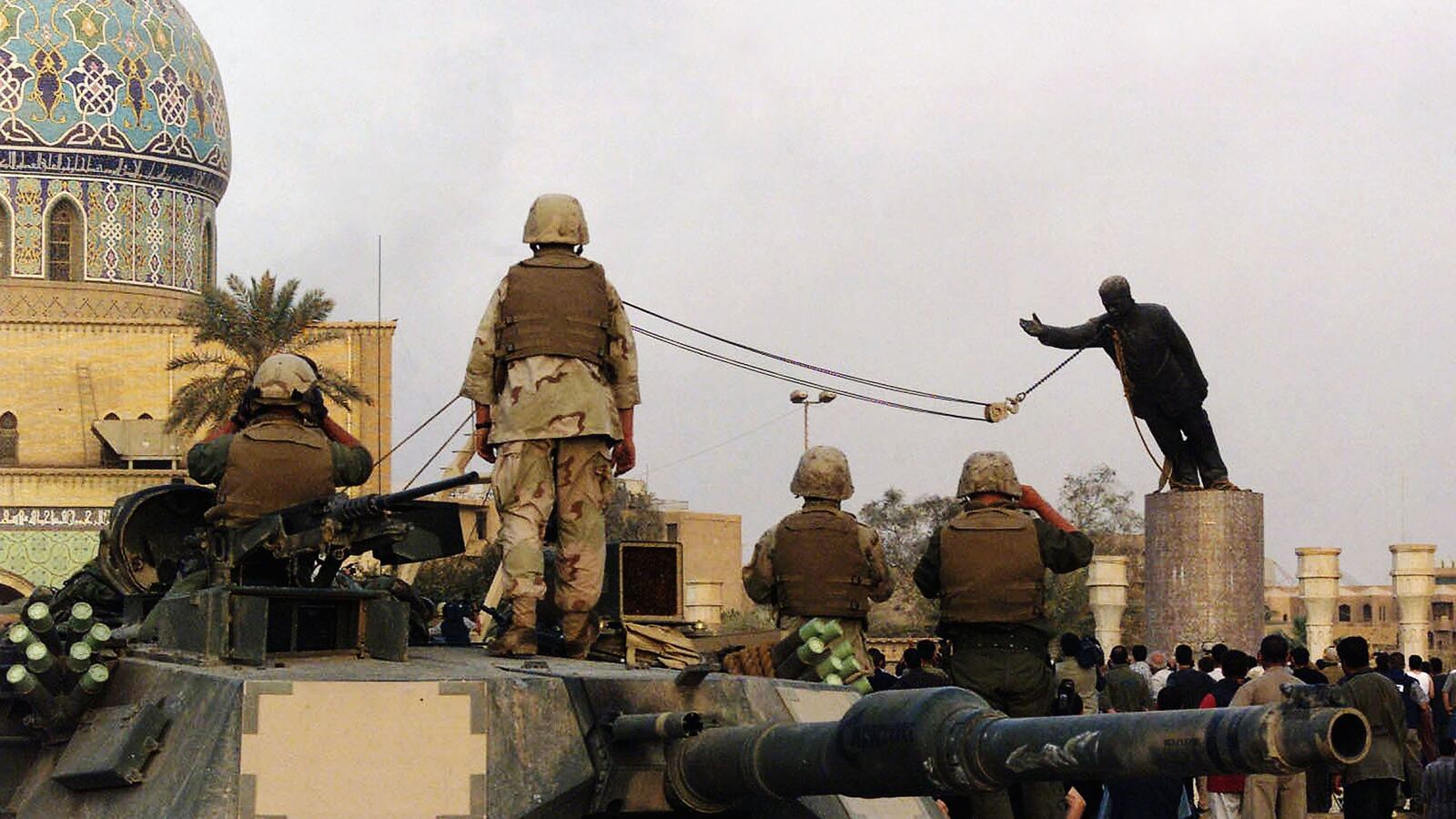A few hours after Baghdad officially fell, I saw a group of young American soldiers scaling an enormous statue of Saddam Hussein and roping his great iron neck in a noose to pull down. It was a dramatic moment. Hundreds of people gathered, some horrified and still frightened, trained in repression and the Republic of Fear that Iraq had been. Some brave souls screamed the first cry of “freedom” they were able to express in years of dictatorship.

After, some of the soldiers—many in their late teens and early 20s—came to my room in the Palestine Hotel to use my satellite phone to call their families. They had come up from Kuwait and had been in the desert for weeks. They had no clue about Iraqi history or politics. They were dirty and tired and sandy. They borrowed my container of stashed water and took improvised showers. They ate some of my biscuits while they politely waited for their turn on the phone.
“Hey Grandma!” said one Asian-American soldier who had been the first up the statue. “That was me who pulled down Saddam!”
It was a rather jubilant moment—if one did not look out my side window and see the looting of Baghdad had begun. I did look, and I saw Iraqi men running with office furniture on their heads and men smashing windows to rob storefronts, taking fistfuls of goods. Comically, and rather metaphorically, an Iraqi man was dragging the head of Saddam—the one from the statue—down a street with a rope, like a dog on a leash.
I went to look for my Iraqi driver, but he had disappeared. My translator was also gone. So was the much-feared minister of information, who had made my life hell for the two months I lived in Baghdad under the Saddam regime in the run-up to the invasion. Anyone who had been part of that now felled system had wisely run for the hills.
I set off on foot and hitchhiked with a TV crew to one of Saddam’s palaces, one near the Tigris where in the Saddam days I had sat with sleazy officials eating river fish and drinking orange soda.
Now the palaces were in the middle of being Americanized. Troops were everywhere, hastily setting up their satellite equipment and moving in crates of food and bottled water and videogames. One soldier had a basketball and was bouncing it on the marble floors.
No one noticed me in the chaos, so I snuck through the cordon and went upstairs in the once opulent palace, now broken and wrecked in the fighting, rather like Saddam. I went through bedroom after bedroom to find the remains of Iraqi lives—officials had clearly been pulled out of bed in the last moments of the shock and awe campaign, hustled into cars to head for the Jordanian or Syrian border before the American troops arrived. It was bizarre.
That night, I heard more fighting down by the river. There were creepy people in my hotel—even creepier than during the regime. Strange American “advisors” who clearly did not have a plan post-invasion. Members of the Iraqi opposition, all vying for jobs. Carpetbaggers already in situ to cash in on the wasted and exhausted city.
I went to look for Iraqi friends who had disappeared, confirming my earlier belief that some of them had been informers or spies of the regime. Some, I knew, were already going off to plan the resistance against the American oppressors. The ones I found were still afraid. There were rumors that Saddam was still around, in a plane in the sky, watching what everyone was doing and saying. He would be back, and he would punish everyone who rejoiced his downfall.
The skeletons of resistance grew stronger. Before the fall, in the weeks and months of the last days of Saddam, I met some of them. They would fight to the death against anyone who would invade their country.
“We don’t like to be occupied,” they would say. “Just look at history.” Where had I heard that before? Afghanistan, where I had worked before Iraq.
The destruction of Iraq and the mess it now is, despite all the hopeful statistics and oil revenue. was inevitable. Everyone who works in the Middle East knows the history. The graveyard of the Ottoman Empire; the fake borders created by the Brits and the French which would cause so much infinite suffering; the corrupt dictators; the appointed tribal leaders who would rise up in the wake of colonialism. It is impossible to draw lines, call it a country and expect the artificial state to survive.
Soon a bloody insurgency gripped Iraq. It was impossible to get to the Friday book market I had once loved in Baghdad. Now Fridays were too bloody to go out and work—car bombs, road blocks, kidnappings.
Shortly before the fall, my translator and I went looking for the grave of Gertrude Bell, that feisty, extraordinary Englishwoman who drew the map of modern Iraq but rarely got credit for it. We got turned back by an Iraqi official. Instead, we snuck into the old British embassy down the river, shut down for years, ghostly and uninhabited. It was a skeleton of a diplomatic outpost, rather symbolic of the old British Empire.
My translator, an Iraqi film historian who loved Martin Scorsese, said as we sat by river, “If the Americans come here, we will slaughter them.”
It is estimated that since 2003, 4,480 American soldiers were killed in Iraq. Some 32,000 were seriously injured. Over 114,000 Iraqis were senselessly killed.
Only 59 of them were believed to be insurgents.
As a reporter and a humanist, I felt gutted by the disaster in Iraq. I was haunted by the clueless Paul Bremer clones I met in Kuwait who were so gung ho to inspire “democracy.” Who gunned for a so-called “regime change.”
I went to work in Africa, where believe it or not, I felt more hopeful. I did go back several times to Iraq, and on one trip, I eventually got to the grave of Mrs. Bell, as she was affectionately called (though she never married).
It was grim and uninspiring. Because I went with an Iraqi politician, I was also accompanied by goons with sub-machine guns, chase cars and bodyguards who yanked me back when I walked too far from our safe haven. I remembered how, pre-April 2003, I had wandered freely through Iraq, from Babylon to Mosul and beyond. I was bugged and followed by secret police maybe, but never with a bodyguard.
I wondered what Mrs. Bell would make of the mess she had a hand in creating, the artificial state of Iraq.
And I never knew what happened to those jubilant American kids I met the first day who pulled down the statue of Saddam.





